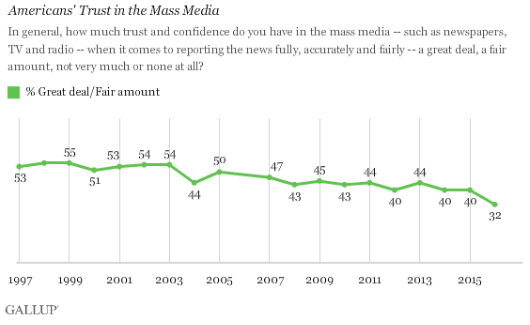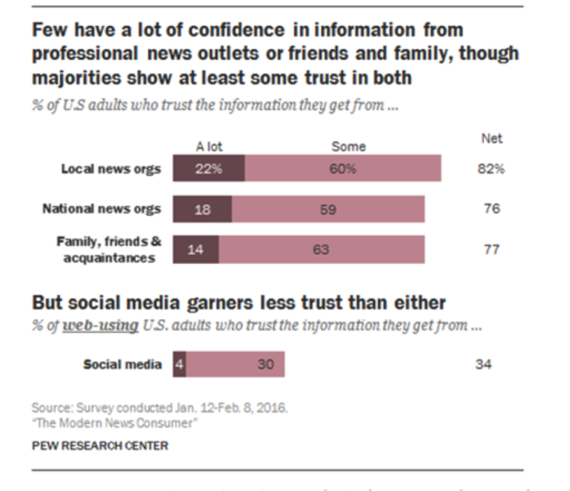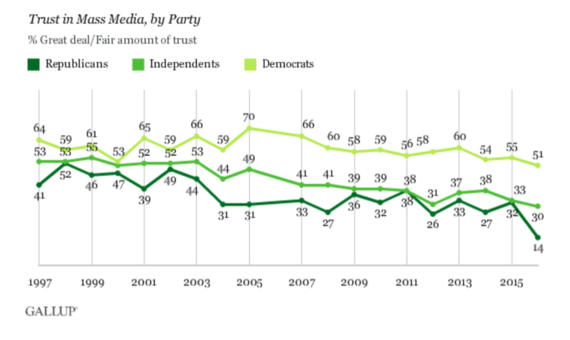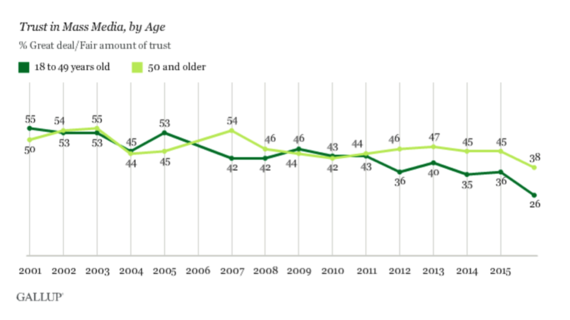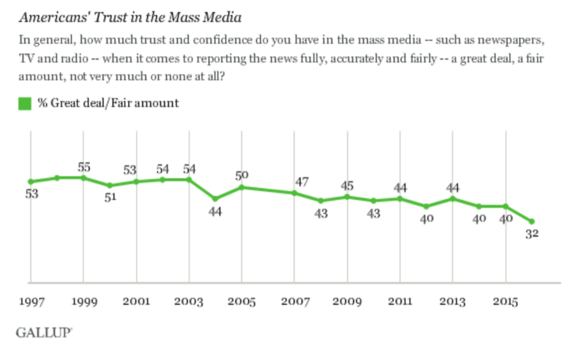Oscar Wilde, ever one of my favorite sources for inspiration, once said:
"In America the President reigns for four years, and Journalism governs forever and ever."
Now, while I hate to be partisan in my writing, I do believe that while I will be primarily quoting US sources and focusing on recent events in "Lower North America," the implications and learnings are fairly universal and I hope that all find something relevant to comment on.
What struck me about Oscar's musings was that while that once seemed an unassailable statement of fact, a pillar of truth upon which we could always lean and be supported, my bet is that if he were alive today he would revise his thinking, perhaps saying...the President reigns for four years but Journalism doesn't even make it to the inauguration.
Let me be clear. As is my custom, this is not a political screed, although I must say I found it amusing that I was attacked by some Trump supporters for mentioning his name in what they deemed a negative light in a prior post...honest truth? His name never appeared...and so it goes...
In fact, if anything, this is about the failure of Journalism across the board to serve any constituency with true and righteous honor. This is a problem for all of us, from simple marketers like me searching for relevant and powerful places to link my clients, to the people of the country and the world looking for some reasonable source to help them make sense of an ever more complex existence.
So when BuzzFeed ignites a global debate on journalistic ethics and imperatives:
BuzzFeed News became the center of a swirling debate over journalistic ethics on Tuesday after its decision to publish a 35-page document carrying explosive, but unverified, allegations about ties between the Russian government and President-elect Donald J. Trump.
I think we need to take a step back and understand, unemotionally, in a non-political view just what is happening in the US and around the world in terms of PEOPLE...the readers, listeners, consumers of what is called journalism or news today.
From The Atlantic:
Although a great deal of excellent journalism is produced every week, it is never hard to find the low-lights. This is hardly a new phenomenon. Twenty years ago in The Atlantic, James Fallows criticized newspaper reporters and the television shows for treating politics like a partisan tug-of-war in which policy issues were reduced to playing the part of the oft-forgotten rope. "The discussion shows that are supposed to enhance public understanding may actually reduce it, by hammering home the message that issues don't matter except as items for politicians to fight over," he wrote.
Point number one: This is not a new issue. In fact the decline has been steady over time. Continued from The Atlantic:
As the...graph indicates, American trust in mass media seems to decline around presidential elections. It fell in 2004, and again in 2008, and again in 2012, and now it's collapsed in 2016.
And, to be fair to journalists and their institutions, the lack of trust swirling around them is part of a greater erosion that is affecting many, if not all, the public entities we once so blindly trusted:
Fewer than half of Americans now say they trust the church, the medical system, the presidency, the Supreme Court, public schools, banks, organized labor, the criminal justice system, big business, and Congress. Public faith in each of these institutions has fallen this decade.
Yet, lest my US readers feel unduly depressed:
...declining trust in institutions is not strictly an American trend. Since the 1960s, "public trust in government and political institutions has been decreasing in all of the advanced industrial democracies," according to one United Nations report. "Although the pattern and the pace of the decrease are dissimilar across countries, the downward trend is ubiquitous."
And there you have it: Across the board a growing lack of trust.
But let's get back to sources of news.
According to Pew Research:
While few have a lot of confidence in the information they get from professional outlets or friends and family, there are large majorities that have at least some trust in both; yet social media gets substantially lower trust scores than all.
What makes this so fascinating is that the data is now a year old and the study was conducted before the worst battles of the recent US election--one can only imagine how the numbers have fallen even more.
In another study the Gallup organization goes further:
Americans' trust and confidence in the mass media "to report the news fully, accurately and fairly" has dropped to its lowest level in Gallup polling history, with 32% saying they have a great deal or fair amount of trust in the media. This is down eight percentage points from last year... Over the history of the entire trend, Americans' trust and confidence hit its highest point in 1976, at 72%, in the wake of widely lauded examples of investigative journalism regarding Vietnam and the Watergate scandal...Older Americans are more likely than younger Americans to say they trust the media, but trust has declined among both age groups this year. Currently, 26% of those aged 18 to 49 (down from 36% last year) and 38% of those aged 50 and older (down from 45%) say they have a great deal or fair amount of trust in the media.
And newspapers who have often prided themselves as the ultimate source for honest brokerage are suffering no less. From Gallup:
The 20% of Americans who are confident in newspapers as a U.S. institution hit an all-time low this year, marking the 10th consecutive year that more Americans express little or no, rather than high, confidence in the institution. The percentage of Americans expressing "a great deal" or "quite a lot" of confidence in newspapers has been dwindling since 2000, and the percentage expressing "very little" or "none" finally eclipsed it in 2007.
So much for "all the news that's fit to print"...
Having said all that and denigrated the entire journalistic news complex, I share one more data point from Gallup that I found to be the most intriguing:
As the ways people consume news grow more complex, Americans are becoming less likely to view their news sources in terms of how they get news -- radio, television, print or internet -- and more in terms of who specifically provides it. Forty-eight percent of U.S. adults still identify a type of media as their main news source, but that is down from 58% just three years ago. Meanwhile, the percentage naming a specific media organization is up from 30% to 42%.
In other words, we are desperate to find specific trusted sources even as we view platforms of distribution--in whatever formats--with skepticism and distrust.
And therein we find the big opportunity for brands, for governments, for media, and for journalists.
It seems we all crave Walter Cronkite--no matter how young or old we are, or even if we don't know who he was...we crave the idea...a trusted, calming voice that we believe in. Someone who tells us, as Walter told our parents and theirs: "And that's the way it is."
As the maelstrom of mistrust and doubt swirls, as the skepticism sucks us all ever downward, we need to keep in mind that we need to break this paradigm. The winner will be transparent, authentic, credible and relevant. To the winner in every category will eventually go the spoils.
As we ponder the future and wonder about BuzzFeed...to be fair wonder about Rolling Stone and the Washington Post as well...fake news, as in evil, intended misdirection, has always been a problem, will always be a problem.
I am far more concerned with returning credibility to the things that once mattered and should still.
Frankly, once again, the issue is not technology, it's not Facebook or Twitter or Snapchat or anything in between.
We, as business people, educators, citizens of the world need to take a stand...it's a PEOPLE FIRST solution that can be solved because once someone, someplace, establishes credibility, the entire façade will fall.
As the US contemplates Martin Luther King Day, this week let me end with his words:
"Our scientific power has outrun our spiritual power. We have guided missiles and misguided men."
And there you have it....
What do you think?
Read more at The Weekly Ramble
Follow David Sable on Twitter: www.twitter.com/DavidSable


